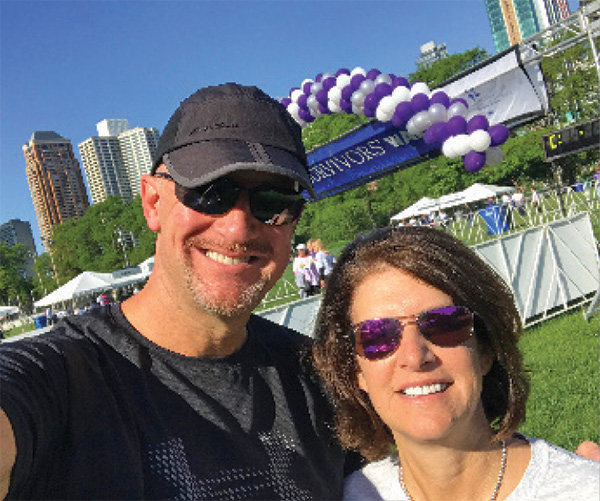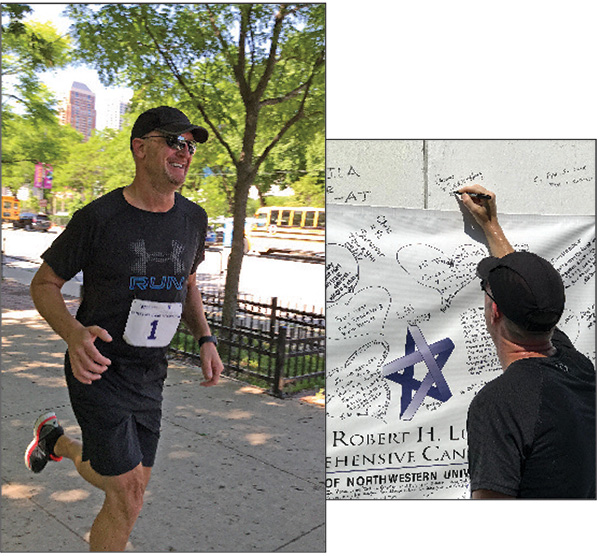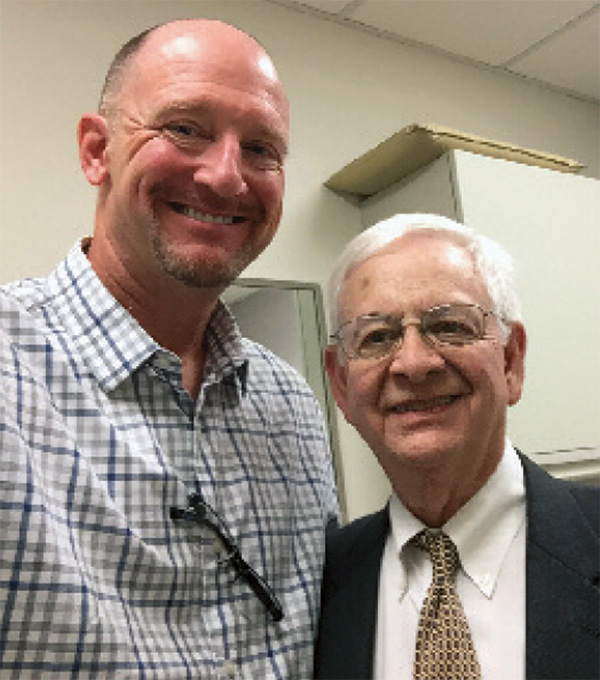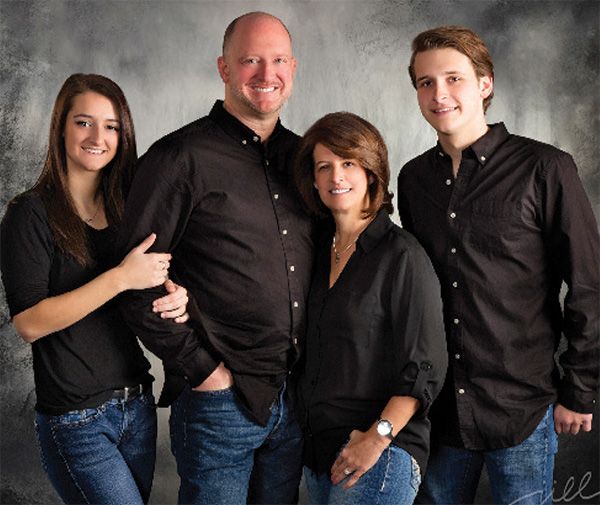Derek Armstrong on Prostate Cancer, Early Diagnosis, and Running the Race

Last June, Derek Armstrong decided to focus on his health— and he implemented an action plan. He had been struggling with his weight, so he changed his diet and starting exercising. He also decided to get a physical. “I was going to be 50 in a couple years, and I hadn’t been to a doctor since I could remember,” Derek said.
The last thing Derek expected was a cancer diagnosis. After his physical, his PSA test results came back at 4.92. Since a PSA of 4 or higher is an indication for a biopsy, his doctor referred him to a local urologist in Peoria, Illinois for the procedure. Even so, no one anticipated finding prostate cancer. “There was no indication that I would have any sort of prostate cancer,” Derek said.

Less than a year after his surgery, Derek Armstrong placed 1st in his age division in the Lurie Cancer Center’s Survivors’ Celebration Walk & 5K.
Yet, the biopsy results showed that he had prostate cancer in 7 of 12 samples. Derek credits the PSA test for the early detection of his disease. “If it weren’t for the PSA, I wouldn’t have known about the cancer,” he said. Derek’s digital rectal examination was normal, and he is not aware of a family history of the disease. Derek’s elevated PSA was the only reason his doctor referred him for a prostate biopsy at age 48.
After the diagnosis, Derek considered his next steps. He had a CT scan and a bone scan, and thankfully neither test showed that the cancer had already spread out of the prostate. His urologist recommended that Derek see Dr. Catalona to discuss having a radical prostatectomy. “My urologist referred me to Dr. Catalona because of his history and expertise in the nervesparing surgery,” Derek said. In early August, Derek met Dr. Catalona, who agreed with Derek’s urologist that surgery was the best option. “Because of the Gleason score and my young age, active surveillance and alternate modalities of treatment weren’t really an option,” Derek said. “The first time I met Dr. Catalona, I bought into his program 100%.”
Exactly 6 weeks after his biopsy, Dr. Catalona performed Derek’s radical prostatectomy. “It was the fastest, most smooth process, given that your life had just been turned upside down,” he said.
Getting healthy and recovering
Just before he was diagnosed with cancer, Derek had started an exercise regimen to lose weight. “I was on a health kick,” he said. “I started walking, progressed to jogging, then to running, and saw immediate results in terms of weight loss and feeling better,” he said.
After his diagnosis, he was motivated to continue exercising. “Running became more of a mental therapeutic outlet,” he said of that time. “It helped me through the process up until I had surgery.” He also wanted to think ahead to the future. “Part of my motivation was not knowing if I would need adjuvant radiation after surgery, if they didn’t get all the cancer cells out. I wanted to be the healthiest I could possibly be, not knowing what the future held,” Derek said.

After his surgery, Derek started walking right away in the hospital to prevent fluid retention, per Dr. Catalona’s instructions. “The nurses were teasing me because I was walking so fast,” he said. Derek returned to his home in Peoria to continue recovering. “You have downtime during recovery,” he said. “But as quickly as my body would allow me to, I got back to walking.” A few months after his surgery, Dr. Catalona gave Derek the all clear to get back to running. “It’s a habit now, something I look forward to.”
As part of his wellness efforts, Derek has also changed his eating habits. “It’s mostly portion control, but certainly incorporating more fruits and vegetables into my diet. I still have pizza, I still have a hamburger occasionally,” he laughed. “But more important for me was changing from being a sedentary person to being an active person.”
Thus far, there is no need for adjuvant radiation or hormonal therapy. His PSA tests since his surgery have been 0.00, with the next test on the 1- year anniversary of his surgery coming up soon. “I received the best possible outcome given my diagnosis, and I couldn’t be more impressed and appreciative of the care I received,” Derek said.
Racing to support others
On June 3, Derek participated in the Lurie Cancer Center’s Survivors’ Celebration Walk & 5K. Derek placed 16th out of 414 participants and came in 1st in his age division. “I knocked 57 seconds off my personal best, down to 7 minutes and 31 seconds average per mile,” he said. “It’s very motivating to be in that environment.” Through his running, Derek also raised $8,000 in donations for the Urological Research Foundation. “I’m very proud of that,” he said. “It makes me feel like I’m doing my part in giving back.”
Recently, Derek joined a running club in Peoria and is training for his next race. “I’m all in,” he said. He uses an app to track his personal running stats and has cultivated a competitive spirit. “I continually surprise myself,” he said, noting that since joining the running club he has already reached a new personal best.
Returning to life, staying healthy

Derek has worked in healthcare business management throughout his career. Currently, he is the chief executive officer for Midwest Orthopedic Center in Peoria, the largest independent orthopedic practice in downstate Illinois. Shortly after his surgery, he was back at work. “Now that it’s nearly 1 year later, my life is back to normal—or as normal as ever—except I’m healthier,” he said.
Derek and his wife, Pamela, have been married for nearly 24 years. Their two children, Alec and Erika, both attend college. The four of them enjoy taking family vacations. “We are fair weather friends,” Derek joked, “so we spend a lot of time at the beach.” They especially enjoy traveling to Florida, their favorite vacation destination. For the past 3 years, they’ve also gone to the Lollapalooza music festival in Chicago as a family, and they became more familiar with Chicago while Derek was going through cancer treatment. They also spend a lot of time with extended family in Peoria.
Derek asked Dr. Catalona how his diagnosis at age 48 might play into his children’s future risk for cancer, since there is now a history of early cancer diagnosis in their immediate family. Dr. Catalona recommended that Derek’s children be screened for breast or prostate cancer earlier than is typically recommended. “As a parent, you worry first about your kids and the impact the diagnosis has on your children,” Derek said. His family was an integral part of his cancer experience. “I felt their support 100%,” he said. “My family has always been there every step of the way.”











